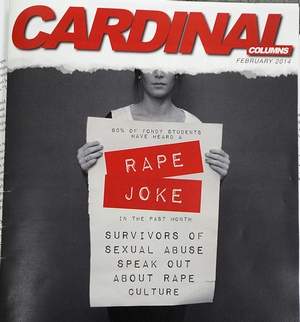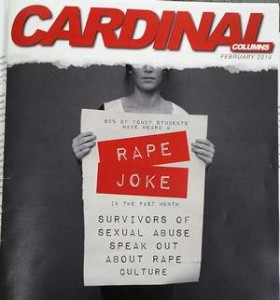
The residents of Fond du Lac, Wisconsin, are no strangers to the practice of censorship. In 2006 they witnessed attempts to ban such works as Maya Angelou’s I Know Why the Caged Bird Sings and Sonya Sones’ One of Those Hideous Books Where the Mother Dies. Now the English faculty at Fond du Lac High School is asking that district administrators get rid of their new censorship policy in the wake of the latest controversy to spark in the community.
16 members of the school’s English department signed and presented a 22-page statement supporting an open forum for student expression in response to Superintendent of Schools James Sebert and high school Principal Jon Wiltzius establishing a new policy, known as “School Guidelines Determined by the Principal regarding Student Publications,” that states all materials created by students are subject to review and possible refusal.
Fond Du Lac High School’s Cardinal Columns magazine made national news when the administration took exception to some of the content published in the February 2014 edition- namely an article entitled “The Rape Joke”, written by senior Tanvi Kumar. The article was an investigation into the rape culture in the school that included anonymous stories from three rape victims.
School officials also disapproved of an editorial that advised students of their right not to stand during the Pledge of Allegiance.
The faculty statement reads in part: “Such guidelines are not only a clear path toward censorship of student expression but also drastically alter the relationship between school publications and the administration and break sharply with roughly 100 years of district precedent regarding such publication.
“We believe that the story itself stands as an exemplar of high-quality, responsible journalism that has helped countless readers feel supported, speak up, seek help, and come together in a way that has undoubtedly resulted in a more positive environment in our school.”
I read Kumar’s article and I have to agree that it was the most heart-pulling, jaw-dropping, and best piece of journalism that I’ve read in a while. What’s even more amazing is that it came from a student. If she keeps up that level of mastery we’ll all be hearing a lot more from her in the future.
The statement also asks that the superintendent and board either abandon the new guidelines or put them on hold “until new guidelines or a new policy may be drafted in collaboration with the students, community, and experts in the field.”
An anti-censorship petition posted online at change.org specifically calls upon Sebert to reverse the administrative mandate. Every time someone signs the petition an automatic email is sent to Sebert’s email. As of today there are over 5,300 signatures in support of the Cardinal Columns staff, including a signature from myself. That’s a lot of voices going to his inbox- but will they be heard or just tossed in the recycle bin?
When The Reporter contacted Sebert, Wiltzius, and School Board President Elizabeth Hayes for reaction to the teachers’ request to revisit the guidelines, Sebert issued the following statement:
“I believe that the guidelines are a reasonable expectation for a school-sponsored publication. The district has a responsibility to protect the educational process, environment, and the interests of all students.”
He declined an interview on the matter.
Cardinal Columns co-editor-in-chief, Rachel Schneider, says, “It’s great the teachers are willing to take a stand for the students because they should have the opportunity to express themselves.” She added that students plan to attend a 5 p.m. school board meeting on Monday to address board members directly.
Matthew Smith, Fond du Lac High School print journalism teacher and adviser to the Cardinal Columns staff, is among those who signed the statement. He points out a clause in the statement that says: “The existence of a policy of prior review has been found to increase the possibility of a school district being found legally liable for articles that are libelous or invade privacy, as evidenced by a report by the Student Law Center.”
School Board Vice President Susan Jones said she is for free speech as long as it isn’t offensive and she believes the issue should be revisited. She commented that Kumar’s article was “really well done” and that some teachers were even reading the article aloud in their classroom, holding it up as a piece of journalistic excellence.
“This is what democracy is all about, this is America and these kids are pretty mature. It’s a big issue in the high school and we should all be concerned about what is going on.”
Sebert and Wiltzius listed concerns about content printed in Cardinal Columns, including the possibility that the subject matter might not be appropriate for immature audiences, the photos might be too suggestive or edgy, that some students may have had their rights violated, that the cover could reflect poorly on the school, and that the issue may not include enough of a “positive focus”.
Well, let’s be honest. If there exists a status quo of rape in the school then the administration has nothing to be positive about and praise should go out to Kumar for exposing it to parents and others in the community.
One issue was with a picture on the inside cover that shows a woman described as “lying lifeless” in the middle of cardboard boxes. On that page the editors explain their cover photo selection process and why they rejected that image for the cover.
In a recent video about the new school guidelines made by broadcast journalism students Wiltzius is asked if predators also need to give consent before journalists can report on their alleged offense and he answered: “Both alleged victims and alleged perpetrators- both have rights.”
Vincent Filak, associate professor in the department of journalism at the University of Oshkosh, has been following the controversy. He said the approach Wiltzius appears to be taking regarding the policy is disturbing.
“I don’t know Jon Wiltzius personally, but his statements on the video paint a disingenuous picture of this policy and how it can be enforced. In one breath, he’s saying that he would offer suggestions or ‘just tweak’ things he thought were problematic or controversial. In the next breath, he admits that students have certain rights, including the right not to stand for the Pledge of Allegiance, but that this is the kind of thing that shouldn’t be part of the school paper. Under this policy, he would not be merely offering suggestions as he says, given that suggestions can be ignored or freely accepted. Instead, he would have the power to remove content he does not like, leaving the students without the right to publish as they see fit. That’s censorship.
“The intent of the superintendent and Mr. Wiltzius might be good in their own minds, but from the perspective of someone who values a free and unfettered press, this is a horrible policy that can lead to disastrous consequences.”
Filak said he would be joining the students at the school board meeting Monday.
The debate has incited a flood of comments on the magazine’s Twitter account @cardinalcolumns and Kumar’s personal account @Tanviiikumar, where she spoke up in a publicly-posted letter to Sebert. In it she states the article had “a lasting effect on this student body and inspired many people” and that she was repulsed by the behavior exhibited by people in the high school, pointing to a supposedly student-run Twitter account called “Ethan the Rapist,” that pokes fun at a very specific rape incident and rape in general.
“This story is not false, defamatory, libelous, vulgar, or profane. Unless you view survivors of horrendous atrocities speaking out against a culture that oppresses them as ‘profane,’ or ‘vulgar’ rather than revolutionary or novel,” she wrote.
School Board President Elizabeth Hayes said she objected to the headline “The Rape Joke” because people might not understand it, as well as the article on the Pledge of Allegiance.
“This publication is supported by taxpayer funds and it should be held to a high standard,” Hayes said. “And we should also be encouraging students to hold high standards of respect.”
First of all, if there are members of the student body whom think it okay to joke about rape on a daily basis and engage in such behavior then this school has a lot of work to do regarding “standards of respect.”
Additionally, those public taxpayers, as well as the students at the school, are citizens of the United States of America and they have a right to express themselves freely; readers also have a right to choose whether they want to engage in the conversations that those thoughts stimulate. If there are restrictions to the rights set forth in the First Amendment to the Constitution, then exactly what kind of a society are citizens pledging allegiance to? If it is one in which rape is a norm and those who dare speak out in defiance of it are silenced, then it isn’t one in which I would want to live, and neither should you.
For more information on the Banned Books Awareness and Reading for Knowledge project and the complete list of titles covered, please visit the official website at http://bbark.deepforestproductions.com/
Sources: Fond Du Lac Reporter, The Northwestern
© 2014 R. Wolf Baldassarro/Deep Forest Productions


Leave a Reply